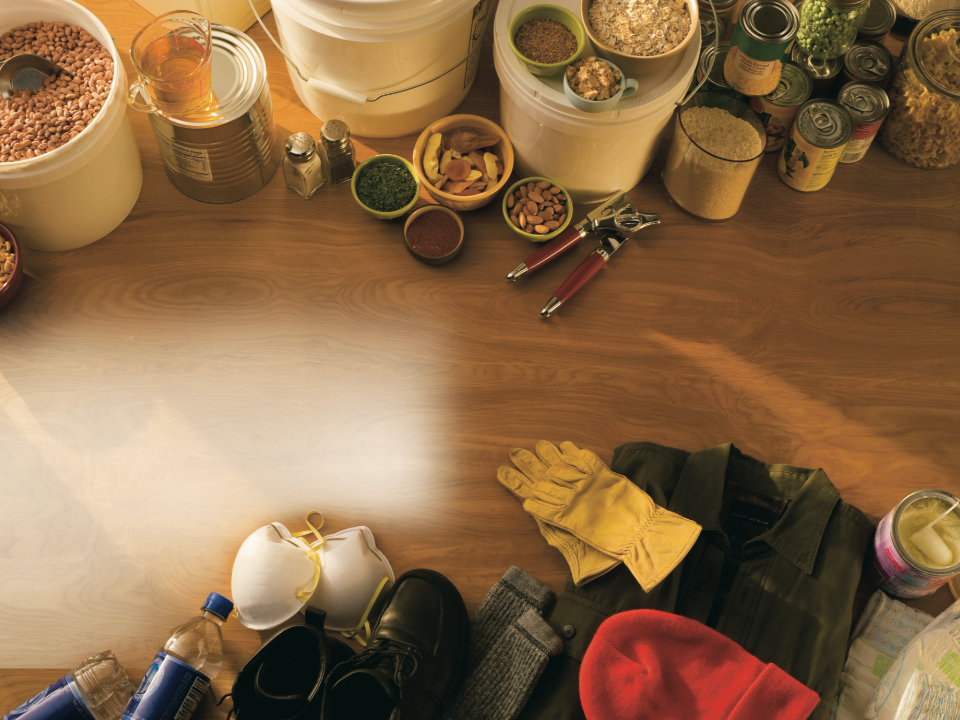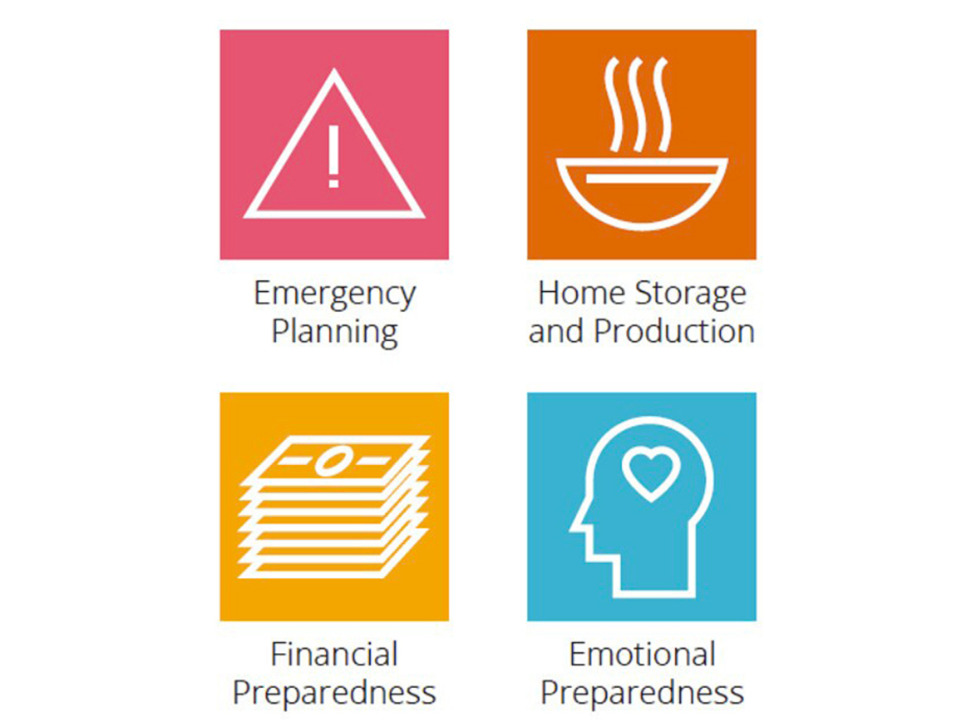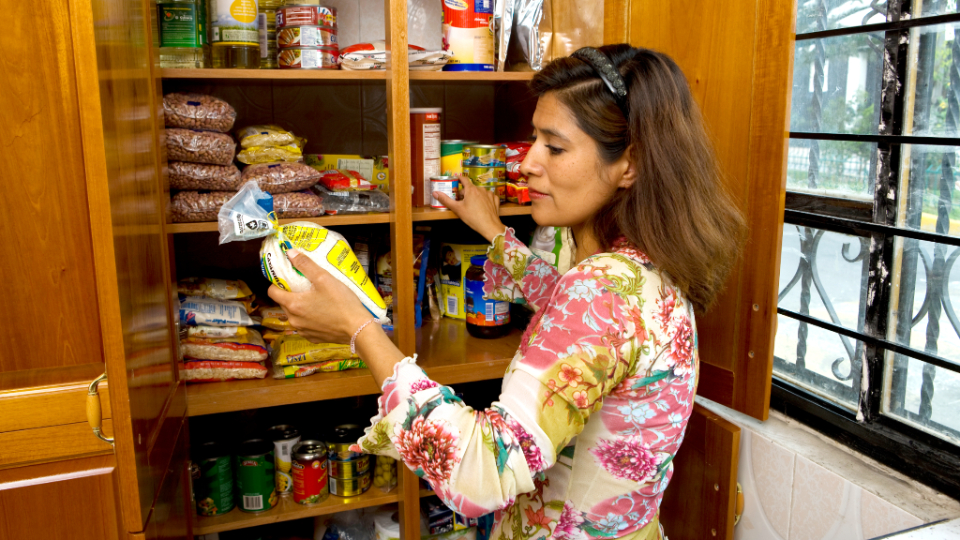
Preparedness
Preparing for an emergency can include packing a 72-hour kit, planning financially, storing food and water and making a family communication plan.2023 by Intellectual Reserve, Inc. All rights reserved.
This story appears here courtesy of TheChurchNews.com. It is not for use by other media.
By Mary Richards, Church News
Recent wildfires, hurricanes, earthquakes and other adversities and challenges around the world may cause some fear and worry. But preparation, both spiritual and temporal, can dispel fear (see Doctrine and Covenants 38:30).
September is National Preparedness Month in the United States, prompting an opportunity not just for those in this country, but for those all over the world to take steps to prepare for disasters and emergencies that could happen at any time.
The Church of Jesus Christ of Latter-day Saints has resources that explain how being prepared now can reduce stress and allow more time to focus on next steps when a disaster happens.
Where and How to Start Preparing for an Emergency
Some ways to prepare for emergencies can include:
- Preparing a portable emergency supply kit.
- Designating a family gathering place or shelter in case of specific disasters or separation.
- Keeping important documents in one place where they can be safe from damage.
- Deciding how to communicate with family in case of an emergency.
- Staying informed on the types of emergencies that can occur in the area and what can be learned ahead of time to be safe.
How to Plan Financially for a Disaster
Whether an emergency is man-made, natural or health-related, here are five tips from the Church’s website for being financially prepared:
- Pay tithing and fast offerings first. The Lord has promised to open the windows of heaven and pour out great blessings upon those who pay tithes and offerings faithfully (see Isaiah 58:6–12; Malachi 3:10).
- Make a budget. A budget is simply a plan for how to use one’s money. Begin with income, and then build a plan for where that money goes, like savings, food, housing, transportation and so on.
- Adhere to the budget. It is OK if things don’t go perfectly. Learn from those moments to improve.
- Spend less money than income. This is key to financial stability. It may mean that individuals and families need to look at their expenses and decide where they should spend less. It could also mean that they need to look at ways to increase their income.
- Save and budget for unexpected expenses. Plan to have a few months of money set aside in case of an emergency or job loss. Planning for the unexpected can help people feel less panicked when tough financial situations arise.
How to Communicate With Family if Phones Are Down

Emergency-preparedness-guides
The Temporal Preparedness Guides from The Church of Jesus Christ of Latter-day Saints offer resources for emergency planning, home storage and production, financial preparedness and emotional preparedness. The Church has guides for specific areas found at https://www.churchofjesuschrist.org/life/AreaPreparednessGuides.2023 by Intellectual Reserve, Inc. All rights reserved.Preparing with one’s family for how to communicate is one of the best tools for them in the event of an emergency. Immediately knowing where to go and whom to call can help individuals think clearly in a chaotic time and reunite with loved ones.
Following are six ways listed in a Caring.ChurchofJesusChrist Instagram post to make effective plans to account for loved ones:
- Make a list of emergency contacts. Include names, phone numbers and addresses for essential family members, medical offices, schools, day care centers, etc. Make contact cards and keep them in easily accessible locations like a purse, wallet or child’s backpack.
- Decide on a family meeting place. Choose a location both in the neighborhood and out of town in case the family cannot get in touch or are unable to go home. Find locations that everyone is familiar with and will remember. Include these locations on the contact cards.
- Teach children how to call 911 (or the emergency number in one’s own country). Help younger children understand how and when to call 911. They should only call 911 when there is a life-threatening emergency.
- “In case of emergency” contacts. Store at least one emergency contact in all mobile devices as “ICE” or “In Case of Emergency.” This will help someone identify who to call when needed. Inform the emergency contact of any medical conditions or other vital health information.
- Utilize text messages. Teach all family members how to send a text message. Texts can often get around network disruptions when phone calls cannot.
- Review the emergency plan. Practice and revise the family communication plan at least once a year or whenever any information changes.
What to Put in an Emergency or 72-Hour Kit
When a disaster strikes, it may take some time for emergency rescuers to locate or reach survivors. In extreme cases, it may take days. In such cases, survivors may go for days without food, water and medical assistance.
The first 72 hours after an emergency or disaster are the most important hours to prepare for. Keeping an updated 72-hour kit will help people reduce stress in a time of need.
- Light and shelter. These items can include: A tent or tarp and duct tape, sleeping bags or warm blankets, flashlights or lanterns, extra batteries.
- Food and water. It is recommended to have one gallon of water per person per day for several days, for drinking and sanitation. Include a several-day supply of non-perishable food items.
- Medical supplies. Necessary medical supplies can include: Prescription medications, over-the-counter medications, first-aid supplies (bandages, ointments, gauze pads, tweezers, etc.).
- Personal hygiene. This can include: Toothbrushes and toothpaste, soap, baby wipes, hand sanitizer, feminine supplies, heavy-duty plastic garbage bags and ties for waste.
- Communication. Communication items could include: Cell phone with chargers and backup battery, family meeting place details, a list of emergency contacts.
- Cash and critical documents. Keep cash and copies of critical family documents in an emergency kit such as: Insurance policies, identification (license, passport, etc.), bank account records.
- Clothing. Include a complete change of clothing and sturdy shoes for each family member. This should be appropriate for the climate. Check this clothing regularly as children may grow out of clothes quickly.
- Other unique needs. This could include: Entertainment/comfort items for children, baby formula, extra contacts or eyeglasses.
Food and Water Storage

Preparedness
Individuals and families can prepare a three-month and long-term food supply to be prepared for any emergency.2023 by Intellectual Reserve, Inc. All rights reserved.According to food storage information in the Life Help section of ChurchofJesusChrist.org, there are three main components of food storage:
- Food supply (three-month and long-term)
- Water supply
- Financial reserve
In considering what food to add to a three-month supply, people should look for foods that are a part of their normal diet. They, while developing a longer-term storage, focus on food staples such as wheat, rice, pasta, oats, beans and potatoes that can last 30 years or more.
Food should be properly packaged and stored in a cool, dry place.
Store water in sturdy, leak-proof, breakage-resistant containers. Consider using plastic bottles commonly used for juices or soda. Keep water containers away from heat sources and direct sunlight.
If water comes directly from a good, pretreated source, then no additional purification is needed; otherwise, pretreat water before use. More ideas for water storage can be found on the Centers for Disease Control’s website.
Of note: Individuals and families need not go to extremes or go into debt to establish a food storage all at once. Develop it gradually to diffuse the overall cost over time so that it will not become a financial burden.
These guidelines can be modified to fit different situations and needs. See a list of specific food items to store long- and short-term in the Temporal Preparedness Guides by Area.
Ways to Cope With Stress After an Emergency

Preparedness
A mother in Romania hugs her daughter while out for a walk. The Church’s Life Help resources are designed to help individuals and families with life’s challenges, including mental and emotional health.2023 by Intellectual Reserve, Inc. All rights reserved.Evaluating mental health is a vital part of checking in after emergency situations have settled. Consider these steps, and find more information in the emotional resilience section of ChurchofJesusChrist.org.
- Limit news consumption. Because news is available to us at the touch of a button, it is easy to increase stress and anxiety by replaying stories from the disaster. Reduce the amount of news that is being read or listened to and focus on relaxing activities instead.
- Talk with someone. Help from friends, family, or a licensed professional can give support during this time. They can be a listening ear and encourage the use of coping strategies.
- Get enough sleep. After a disaster or emergency, it is common to wake up during the night or have trouble sleeping. If someone’s mind is racing, they can try writing down their thoughts in a journal before going back to bed. Avoid caffeine and cellphones or laptops before going to sleep.
- Establish a daily routine. Eat meals at regular times and create a consistent sleep schedule to be sure to get enough rest. Schedule exercise or other daily activities to reduce stress levels.
- Take a break when needed. If someone is feeling stressed or anxious after a disaster, they should give themselves the time and space needed to recover. This includes taking regular breaks when needed.
- Understand that things may change. Disasters and emergencies can destroy homes, businesses, schools or places of worship. Sometimes loved ones are lost or sustain major injuries. It is important for each person to give themselves time and space to grieve these changes.
- Pray. Prayer can help people better understand and cope with the uncertainties that come after a disaster. Ask for help from God to bring peace during difficult moments and bless others.
- Recognize when more help is needed. If someone is struggling and in need of help, reach out to a licensed professional for assistance.
More Church Resources for Emergency Preparedness
- How to Prepare a Home Water Supply
- Food Storage Gospel Topics Page
- Tips for Making an Emergency Plan
- Tips for Being Financially Prepared
- Tips for Emotional Preparedness
- Self Reliance: How to Make a Go-Bag
- Helping Others Prepare for Unexpected Needs
- Personal and Family Emergency Preparedness Planning Guide
- Temporal Preparedness Guide by Area
- Building Self-Reliance
Copyright 2023 Deseret News Publishing Company.